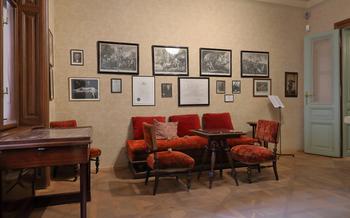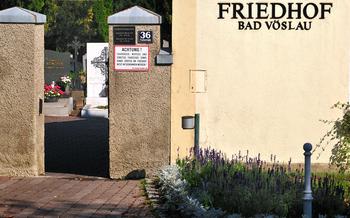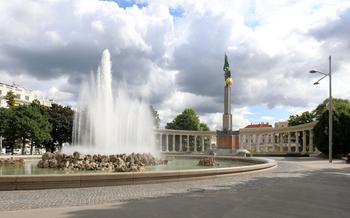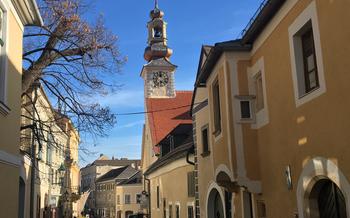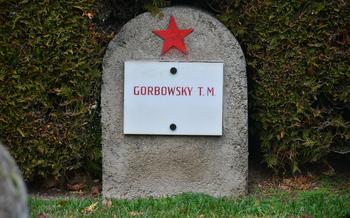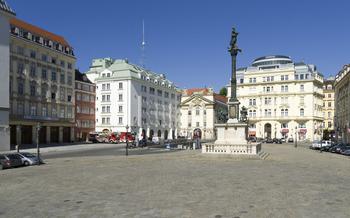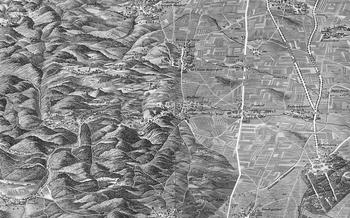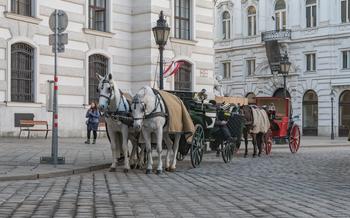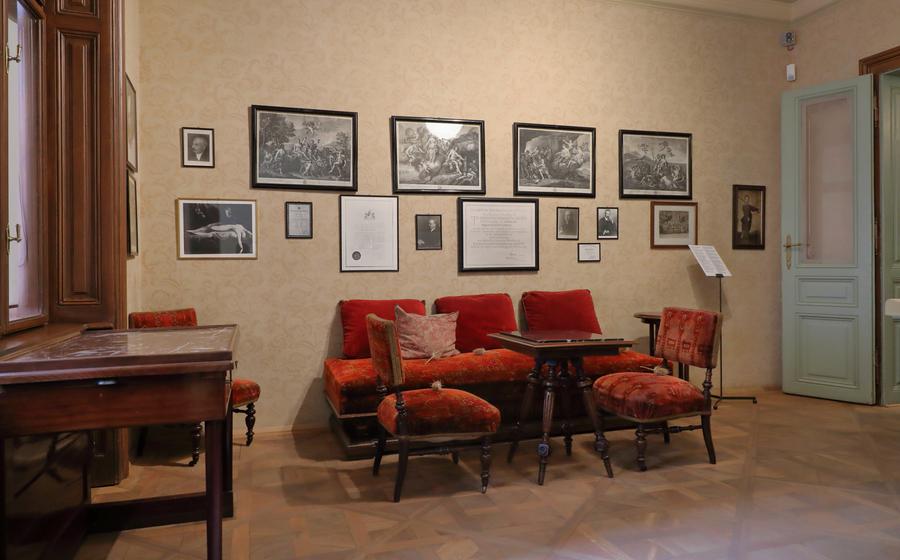
Freud Museum
- Sigmund Freud Museum: A Journey into the Mind of a Genius
- Delving into the Life of Sigmund Freud
- Exploring the Museum's Unique Atmosphere
- Unveiling Freud's Famous Theories
- Discovering Freud's Clinical Practice
- Interactive Exhibits for a Deeper Understanding
- Guided Tours for an Enriching Experience
- Exploring the Museum's Library and Archives
- Temporary Exhibitions and Special Events
- Souvenirs and Gifts for Freud Enthusiasts
- Planning Your Visit to the Freud Museum
- Transportation Options to Reach the Museum
- Nearby Attractions and Points of Interest
- Accommodations near the Freud Museum
- Insider Tip: Hidden Gems of the Museum
Sigmund Freud Museum: A Journey into the Mind of a Genius
Historical significance
The Sigmund Freud Museum in Vienna, Austria, is a unique and captivating destination that offers visitors a profound journey into the life and work of one of the most influential figures in modern psychology. Established in 1971 in Freud's former residence at Berggasse 19, the museum meticulously preserves the legacy of the psychoanalytic pioneer and provides a comprehensive exploration of his groundbreaking theories and contributions to the field of psychology.
Exhibition highlights
The museum's extensive collection includes original furniture, personal artifacts, and historical documents that belonged to Freud and his family, offering an authentic glimpse into his daily life and professional practice. Interactive multimedia displays, virtual reality experiences, and educational exhibits further enhance the visitor's understanding of Freud's complex theories and their impact on modern psychology.
Guided tours
Knowledgeable and passionate guides lead insightful tours through the museum, providing visitors with a deeper understanding of Freud's life, work, and lasting influence. Through anecdotes, personal stories, and Q&A sessions, these tours offer a unique opportunity to engage with Freud's legacy and gain a fresh perspective on his profound contributions to our understanding of the human mind.
Delving into the Life of Sigmund Freud
Sigmund Freud's early life and education laid the foundation for his groundbreaking theories that would revolutionize the field of psychology. Born in Freiberg, Moravia (now Příbor, Czech Republic) in 1856, Freud's brilliance was evident from a young age. He excelled in his studies, showing a particular aptitude for science and philosophy. In 1873, he enrolled in the University of Vienna to study medicine, where he developed a keen interest in neurology and psychiatry.
Freud's groundbreaking theories, primarily centered around psychoanalysis, challenged conventional notions of the human mind. He introduced the concept of the unconscious mind, proposing that it harbors repressed thoughts, desires, and memories that significantly influence our behavior and emotions. His theory of psychosexual development outlined the stages individuals go through from infancy to adulthood, emphasizing the impact of childhood experiences on personality formation.
Freud's contributions to psychoanalysis extended beyond theoretical constructs. He developed innovative therapeutic techniques, including free association and dream analysis, to delve into the unconscious mind and help patients uncover the root causes of their psychological distress. His work laid the foundation for modern psychotherapy and continues to influence diverse fields, including psychiatry, psychology, and counseling.
Exploring the Museum's Unique Atmosphere
Step into the world of Sigmund Freud as you wander through the historic halls of Berggasse 1
Immerse yourself in the authentic surroundings, where original furniture and artifacts bring Freud's presence to life. Stroll through the dimly lit corridors, adorned with artwork, photographs, and personal touches from Freud's family.
Experience the ambiance of Freud's consulting room, where he spent countless hours delving into the depths of the human mind. Sit in his iconic armchair, as if you were a patient seeking guidance from the master of psychoanalysis.
The museum's carefully curated exhibits and interactive displays create an immersive journey that allows visitors to connect with Freud's life and work on a personal level. Prepare to be captivated by the fascinating story of the mind as you explore this unique and atmospheric haven of psychoanalysis.
Unveiling Freud's Famous Theories
Psychoanalytic theory, often regarded as Freud's most influential contribution, focused on the unconscious mind and its impact on human behavior and personality. Freud believed that early childhood experiences shape our unconscious thoughts, feelings, and actions, even if we are unaware of them. His interpretation of dreams, a cornerstone of psychoanalysis, emphasized the significance of dream analysis in revealing hidden desires and conflicts buried in the unconscious.
Freud also explored the concept of the unconscious mind, postulating that it contains repressed thoughts, memories, and emotions that are inaccessible to conscious awareness. He believed that these unconscious elements significantly influence our behavior and mental processes, often leading to psychological distress.
Another key element of Freud's theories is his exploration of defense mechanisms, which he proposed as the mind's way of protecting itself from anxiety-provoking thoughts and feelings. These mechanisms, such as repression, projection, and displacement, often distort reality and lead to irrational behavior.
Discovering Freud's Clinical Practice
In the Freud Museum, visitors can step back in time and explore the very rooms where Sigmund Freud conducted his groundbreaking psychoanalytic work. The consulting room, with its iconic couch, waiting area, and library, offers a glimpse into Freud's clinical practice and the development of psychoanalysis.
The museum showcases a collection of case studies and patient histories, providing insights into Freud's methods and the challenges he faced in treating mental illnesses. Visitors can learn about the origins of psychoanalysis, the development of dream interpretation, and the concept of the unconscious mind.
Freud's clinical practice had a profound impact on the field of psychology, revolutionizing the way we understand and treat mental health disorders. The museum offers a unique opportunity to explore the legacy of this pioneering figure and his lasting contributions to modern psychotherapy.
Anecdote:
One of the most intriguing artifacts in the museum is Freud's collection of antique statuettes and Egyptian antiquities. These objects, which he kept in his consulting room, are believed to have served as a source of inspiration and contemplation during his sessions with patients.
Interactive Exhibits for a Deeper Understanding
The Freud Museum features a range of interactive exhibits that enhance the visitor experience and provide a deeper understanding of Freud's theories and work. Multimedia displays showcase key concepts and theories, while interactive installations allow visitors to engage with Freud's ideas in a hands-on way. Virtual reality experiences transport visitors to Freud's consulting room, offering a glimpse into his clinical practice and interactions with patients. Educational activities, such as quizzes and games, make learning about Freud's theories both enjoyable and informative. These interactive elements complement the museum's collection of artifacts and documents, creating a dynamic and engaging learning environment.
Guided Tours for an Enriching Experience
To fully grasp the significance of Freud's work and gain insights into his personal life, guided tours are highly recommended. Led by knowledgeable and passionate guides, these tours offer a comprehensive exploration of the museum's exhibits and provide a deeper understanding of Freud's theories, clinical practice, and lasting impact on psychology.
The guides, who are experts in Freud's life and work, share fascinating anecdotes and personal stories that bring Freud's personality and contributions to life. They delve into the intricacies of his groundbreaking theories, such as the psychoanalytic theory, the interpretation of dreams, the unconscious mind, and defense mechanisms, explaining their significance in shaping modern psychology.
Interactive Q&A sessions allow visitors to engage directly with the guides, ask questions, and clarify doubts. This interactive format encourages a deeper understanding of Freud's complex ideas and their relevance to contemporary psychological practices.
By participating in a guided tour, visitors gain a richer appreciation of Freud's genius and the profound influence his work has had on our understanding of the human mind and behavior.
Exploring the Museum's Library and Archives
Delve into the treasure trove of knowledge housed within the Freud Museum's library and archives. This extensive collection boasts a vast array of books, manuscripts, and rare editions, offering a comprehensive insight into Freud's life and work. Peruse first publications and immerse yourself in the evolution of his groundbreaking theories. Scholars and researchers will find a wealth of primary sources, including Freud's personal correspondence, providing an unparalleled opportunity to delve into the mind of this intellectual giant. Whether you're a seasoned academic or simply curious about the origins of psychoanalysis, the Freud Museum's library and archives offer a rich and rewarding experience.
Temporary Exhibitions and Special Events
Complementing the permanent exhibits, the Freud Museum hosts a variety of temporary exhibitions that delve deeper into specific aspects of Freud's life and work, or explore related themes in psychoanalysis and psychology. These exhibitions often feature rare artifacts, personal documents, and multimedia installations that provide a fresh perspective on Freud's contributions.
The museum also organizes a range of special events throughout the year, including workshops, lectures, conferences, film screenings, and book launches. These events offer a platform for scholars, experts, and enthusiasts to engage in discussions, share research findings, and explore new ideas related to psychoanalysis and mental health.
Collaborations with other cultural institutions and organizations allow the Freud Museum to present a diverse program of events, attracting a wide audience interested in the history of psychology, the arts, and the human mind.
Souvenirs and Gifts for Freud Enthusiasts
The Freud Museum's gift shop is a treasure trove for anyone interested in the life and work of Sigmund Freud. Whether you're a casual visitor or a dedicated scholar, you'll find a wide range of items to commemorate your visit.
The shop offers an assortment of books, including Freud's own works, biographies, and critical analyses. You'll also find a selection of postcards, posters, and memorabilia featuring images of Freud, his family, and his study.
For those looking for something more unique, the shop offers a variety of gifts inspired by Freud's theories and life. These include items such as dream-catcher necklaces, psychoanalysis-themed coffee mugs, and even plush toys shaped like Freud's famous couch.
The museum also has an online shop, so you can browse and purchase items from the comfort of your own home. This is a great option for those who live far from the museum or who simply prefer to shop online.
Whether you're looking for a gift for yourself or for a friend or family member, you're sure to find something special at the Freud Museum's gift shop.
Planning Your Visit to the Freud Museum
To ensure a fulfilling and enjoyable experience at the Sigmund Freud Museum, meticulous planning is essential. The museum is conveniently situated in the heart of Vienna, within easy reach of major landmarks and attractions. Its proximity to the U4 metro line and the 40A bus route makes it easily accessible by public transportation. If you prefer to explore the city on two wheels, bicycle rental facilities are available nearby, and dedicated bike lanes provide a safe and scenic route to the museum. For those arriving by car, parking garages are located within a short walking distance.
To fully immerse yourself in Freud's life and work, guided tours are highly recommended. These insightful tours are led by knowledgeable and passionate guides who offer fascinating insights into Freud's groundbreaking theories, clinical practice, and personal life. Tours are available in several languages and must be booked in advance to secure your spot.
Admission fees are reasonable and vary depending on the type of ticket and any special exhibitions. Discounts are available for students, seniors, and groups. It's advisable to purchase tickets online to avoid queues and guarantee your entry, especially during peak tourist season.
To make the most of your visit, plan to spend at least two hours exploring the museum's exhibits and engaging in interactive experiences. Guided tours typically last for 60-75 minutes, allowing ample time for self-guided exploration afterward. The museum staff is always ready to assist with any questions or provide additional information to enhance your experience.
By carefully planning your visit to the Sigmund Freud Museum, you can embark on an enriching journey into the mind of a genius and gain a profound understanding of his revolutionary contributions to psychology.
Transportation Options to Reach the Museum
Conveniently located in the heart of Vienna, the Freud Museum is easily accessible by various transportation options.
-
Public Transportation:
- Take the U-Bahn (metro) line U6 and get off at the "Alser Straße" station. The museum is a short walk from there.
- Alternatively, take the tram lines 43 or 44 and get off at the "Berggasse" stop.
-
Parking:
- Limited street parking is available in the area, but it can be challenging to find a spot.
- Consider using a nearby parking garage, such as the one at the Alser Straße underground station.
-
Bicycle Rental:
- Vienna has an excellent bike-sharing system called Citybike. Rent a bike and enjoy a scenic ride to the museum.
- There are several bike rental shops near the museum, such as Radverleih Wien and Pedal Power.
-
Walking:
- If you're staying in the city center, the Freud Museum is within walking distance. It's a pleasant 20-minute walk from the Stephansplatz square.
Nearby Attractions and Points of Interest
The Freud Museum is situated in the vibrant district of Alsergrund, offering a wealth of nearby attractions to complement your visit. History buffs can explore the Votive Church, a magnificent Neo-Gothic edifice, or delve into the Jewish Museum Vienna, showcasing the rich history and traditions of the city's Jewish community.
For a dose of culture, the Theater in der Josefstadt, renowned for its classical productions, is just a stone's throw away. Art enthusiasts can admire masterpieces at the Leopold Museum, housing a vast collection of Austrian art from the 19th and 20th centuries.
If you seek retail therapy, the Mariahilfer Straße, Vienna's renowned shopping street, is within walking distance, offering a diverse range of boutiques, department stores, and international brands. Alternatively, the charming Naschmarkt, a vibrant market with an eclectic mix of food stalls, vintage shops, and cafes, provides a unique shopping experience.
After a day of exploration, savor Viennese delicacies at Gastwirtschaft Wratschko, a traditional Viennese restaurant known for its authentic atmosphere and hearty Austrian cuisine. Alternatively, unwind with a cup of coffee and delectable pastries at Café Central, a historic coffee house frequented by intellectuals and artists throughout the centuries.
Accommodations near the Freud Museum
For visitors planning to immerse themselves in the world of Sigmund Freud, there is no shortage of accommodation options near the Freud Museum. A diverse range of hotels and guesthouses caters to various budgets and preferences.
Budget-conscious travelers can find cozy hostels and guesthouses within walking distance of the museum. These options offer basic amenities and a chance to meet fellow travelers from around the world.
For a more luxurious stay, several upscale hotels are located nearby, providing guests with elegant rooms, exceptional service, and convenient access to the museum and other attractions.
Proximity to public transportation is a key consideration for many visitors, as the museum is well-connected by metro and bus lines. Staying near a metro station allows for easy exploration of Vienna's other cultural landmarks and vibrant neighborhoods.
For those seeking a local experience, charming guesthouses and bed and breakfasts offer a glimpse into Viennese hospitality. These accommodations often provide insider tips and recommendations for exploring the city's hidden gems.
Whether you prefer budget-friendly hostels, elegant hotels, or cozy guesthouses, there's an accommodation option near the Freud Museum to suit every taste and budget.
Insider Tip: Hidden Gems of the Museum
Beyond the main exhibits and guided tours, the Freud Museum holds hidden treasures waiting to be discovered by curious visitors.
